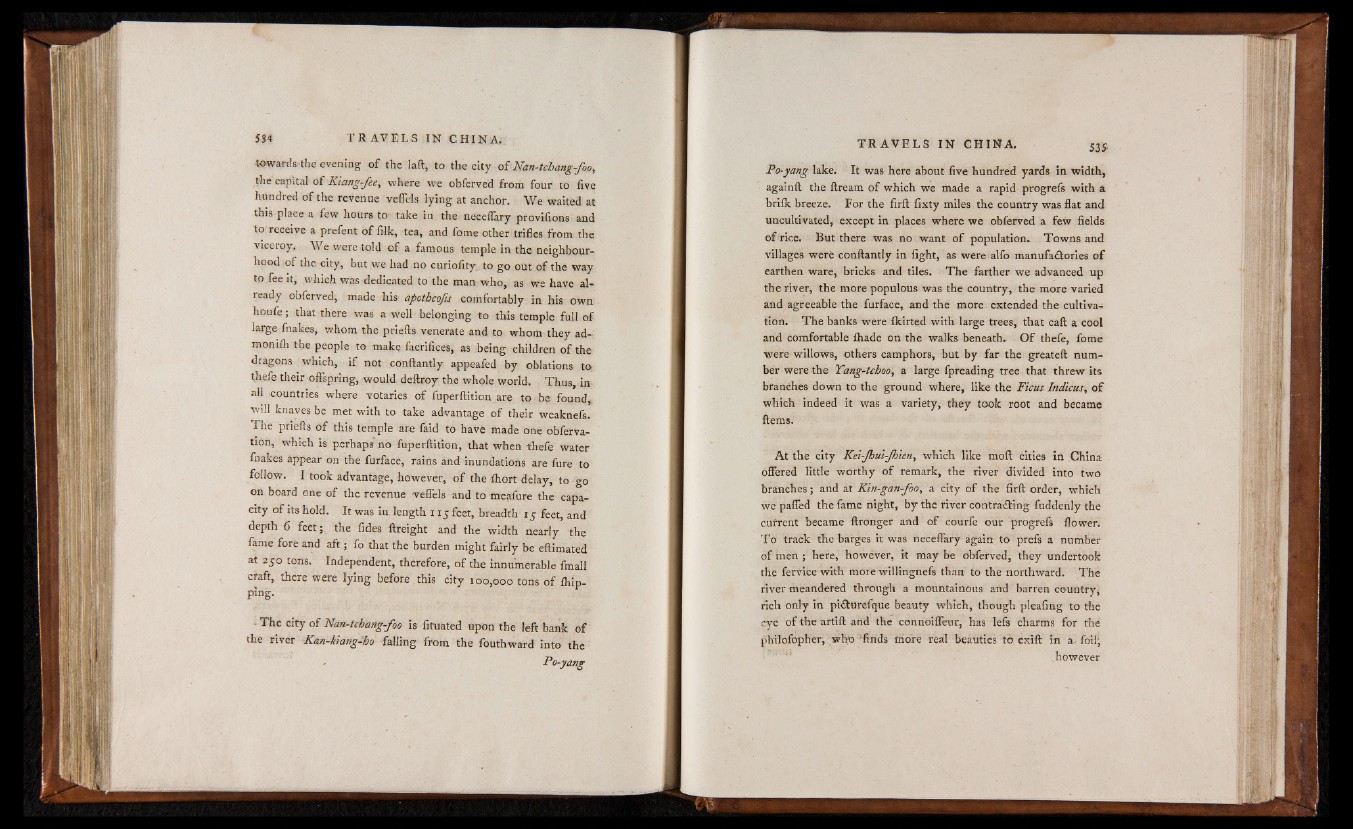
towards the evening o f the laft, to the city o f'Nan-tchang-foo,
the capital o f Kiang-fee, where we obferved from four to five
hundred o f the revenue veflels lying at anchor. We waited at
this place a few hours to take in the neceflary provifions and
to receive a prefent o f filk, tea, and fotne other trifles from the
viceroy. We were told o f a famous temple in the neighbourhood
o f the city, but we had no curiofity, to go out o f the way
to fee it, which was dedicated to the man who, as we have already
obferved, made his apotheofis comfortably in his own
houfe; that there was a well belonging to this temple full o f
large fnakes, whom the priefts venerate and to whom they ad-
moniih the people to make facrifices, as being children o f the
dragons which, i f not conftantly appeafed by oblations to
thefe their offspring, would deflxoy the whole world. Thus, in
all countries where votaries o f fuperftition are to be found*
will knaves be met with to take advantage o f their weaknefs.
The priefts o f this temple are faid to have made one obferva-
tion, which is perhaps no fuperftition, that when thefe water
fnakes appear on the furface, rains and inundations are fure to
follow. I took advantage, however, o f the ihort delay, to go
on board one o f the revenue -veflels and to mealure the capacity
o f its hold. It was in length 1 15 feet, breadth 15 feet, and
depth 6 feet; the fides ftreight and the width nearly the
fame fore and a f t ; fo that the burden might fairly be eftimated
at 250 tons. Independent, therefore, o f the innumerable fmall
craft, there were lying before this city 100,000 tons o f fhip-
ping.
-T he city o f Nan-tehang-foo is fituated upon the left bank o f
the river Kan-kiang-ho falling from the fouthward into the
Po-yang
Po-yang lake. It was here about five hundred yards in width,
againft the ftream o f which we made a rapid progrefs with a
briik breeze. For the firft fixty miles the country was flat and
uncultivated, except in places where we obferved a few fields
o f rice. But there was no want o f population. Towns and
villages were conftantly in fight, as were alfo manufactories o f
earthen ware, bricks and tiles. The farther we advanced up
the river, the more populous was the country, the more varied
and agreeable the furface, and the more extended the cultivation.
The banks were ikirted with large trees, that call a cool
and comfortable Ihade on the walks beneath. O f thefe, fome
were willows, others camphors, but by far the greateft number
were the Yang-tcboo, a large fpreading tree that threw its
branches down to the ground where, like the Ficus. Indicus, o f
which indeed it was a variety, they took root and became
items.
A t the city Kei-Jhui-Jhim, which like moll cities in China
offered little worthy o f remark, the river divided into two
branches; and at Kin-gan-foo, a city o f the firft order, which
we paffed the fame night, by the river contracting fuddenly the
current became ftronger and o f courfe our progrefs flower.
T o track the barges it was neceffary again to prefs a number
o f men ; here, however, it may be obferved, they undertook
the fervice with more willingnefs than to the northward. The
river meandered through a mountainous and barren country,
rich only in piCturefque beauty which, though pleafing to the
eye o f the artift and the connoiffeur, has left charms for the
philofopher, who finds more real beauties to exift in a- foil;
however